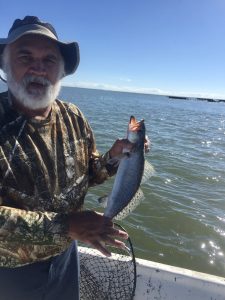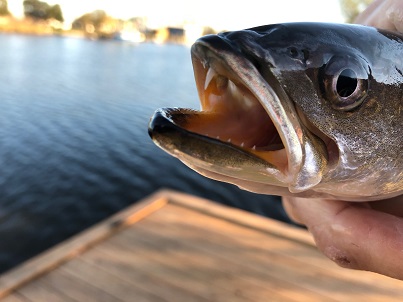Louisiana Wildlife Federation (LWF) supports a change to regulations for recreational harvest of spotted seatrout (speckled trout) in Louisiana to address the reported decrease in species population over the past several years.
LWF would support a creel of 15 and a minimum size of 13.5 inches that was labeled “Option II” from among several proposed management options to recover the population in five years. LWF urges the Louisiana Wildlife and Fisheries Commission to adopt this change as the one preferred by the saltwater anglers who responded to surveys in 2020 and in 2021.
While no single option had overwhelming support from those surveyed, Option II was one of two options presented that was more highly rated than the current regulations as asked in the 2021 survey. This is a clear signal that anglers see a need for change to address concerns over declines in speckled trout. Commissioners can review the recovery data from year to year and adjust if needed. For uniformity in enforcement and ease in understanding the new regulation, LWF would support making this change apply for all areas of coastal Louisiana.
In November 2021, staff members with the Louisiana Department of Wildlife and Fisheries reported the results of surveys conducted by email and on their website to solicit feedback from saltwater anglers about their preferences for suggested regulation changes to recover the spotted seatrout population in Louisiana. Multiple options were proposed for changes in creel, minimum size, and/or slots to meet a goal of recovering population numbers within 5 years.
Nearly half of respondents reported that speckled trout fishing has gotten worse in their favorite/regular fishing spots and 90% reported concern about declines in specks. There is recognition among many recreational anglers that management and regulations should address the threat of declining numbers of speckled trout. LWF agrees with making a change.
 You can review summary reports on the survey data collected and listen to presentations and discussion about declining spotted seatrout at the Department’s website: https://www.wlf.louisiana.gov/page/spotted-seatrout
You can review summary reports on the survey data collected and listen to presentations and discussion about declining spotted seatrout at the Department’s website: https://www.wlf.louisiana.gov/page/spotted-seatrout



I oppose changing the size limit and daily Limit! I regularly fish in Hopedale and throughout Biloxi marsh, lake Bornge, & bays/waters to the East. ISee and catch enormous amount of small speckle trout as well as catching limits of legal size Trout. There are low percentage of recreational fisherman catching limits of trout. I’m not sure where the Louisiana wildlife and fisheries are getting samples from but should be in front of the Biloxi marsh area where there are considerable amount of Trout and other species of fish. Hi oppose changing the limit for recreational fisherman.
I wonder how many undersized trout die during the throwback (ie undersized )part of the fishing trip !!!!
Years ago limit was 100 trout no size limits people would catch whateversize they could ,go home with smaller fish ,and didnt kill 75 percent of what they caught from rough handling undersized fish im for a smaller limit 15 is fine but when you catch and release 50 or so small trout under 12 inches as current how many of those fish die because they are just an inch short of being legal ?fisherman destroy more fish that way inadvertently and most are none the wiser !!! Let them catch the first 15 and they go home happy and dont have to catch and release 75 trout to get 15 !!!!!
Its got to save fish !!! Study that
I agree with these proposed regulations on specs 100%
The reduced number of trout is due to freshwater intrusion impacting the trout spawn. Trout eggs need salinity to float into the marsh, hatch, and grow. Changing the regulations, specially size restrictions, will do little to change this fact. Also, trout batch spawn from April to September, and the fishery can rebound quickly if the environment supports it. You should support rebuilding the coast instead of the fallacy of diversions. Diversions equals major impact on our world-class saltwater fishery.
LDWF looked at results from recent years’ fishing tournaments and those numbers are down too. That’s independent data showing that overall, speckled trout catch is down, even for anglers trying to maximize for a tournament. Also, the Finfish Task Force voted to support changes to regulations, acknowledging the stock is in trouble. For years, we’ve been allowed limits that the biologists said were acceptable and now the biologists are saying the pressure is too much and limits need to change.